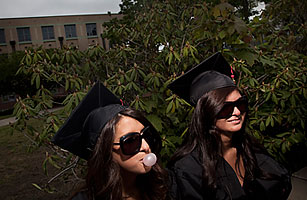
In her May 25 “class day” speech to graduating seniors at Harvard, comedian Amy Poehler joked that postcollege life is like “a heist that requires good drivers, an explosives expert, a hot girl who doubles as a master of disguise.” The line got some chuckles, but it also struck a nerve. For college grads, nabbing a good job in this economy may seem as far-fetched as pulling off a successful bank robbery. A recent study from Rutgers University analyzing data from 2006 to 2010 found that more than 30% of recession-era college grads didn’t land a job within six months of finishing school. And those who did find one were being paid less. The scramble for postcollege work has graduates racking their brains for ideas on how to get a good gig. “They’re a much more sober group,” says Allen Green, dean of student life at Sarah Lawrence College, where visits to the career-services office are up 35% this year. His college’s focus on liberal arts has left many students willing to take anything that pays the bills, and often less than that. Postcollege internships have become the short-term fix, but they require sacrifices from budding adults. A recent poll conducted by consulting firm Twentysomething Inc. found that a startling 85% of graduates are taking shelter under Mom and Dad’s roof. Despite the meager payoffs of their degrees, many graduates think the solution is more education–and more debt. Sixty-two percent of college grads in the Rutgers study believed they needed more education to be successful. Meanwhile, a new study by ManpowerGroup finds that one-third of employers worldwide are struggling to find qualified talent. The idea that there are too many overqualified college graduates and too many underqualified job candidates may seem contradictory. But the mismatch partly has to do with what students are choosing to study, says ManpowerGroup president Jonas Prising. Young college grads with an education or engineering major are more likely to find a job that matches the rigor of their college degree than are grads who majored in the humanities, according to 2009 Labor Department data. Some employers point the finger at the education system, which fails to get kids interested in what the economy really needs: scientists and engineers. Prising says a large number of college grads simply have the wrong skills. “Liberal-arts skills are in oversupply, and that’s an education issue,” he says. But it isn’t just the English majors who are having a tough time. “Our students get lulled into thinking job searching will be easy, so they get really discouraged after a few tries,” says Maurine Riess, career-services coordinator at the University of Texas at Austin’s geosciences school. Reed College’s alumni director, Mike Teskey, says the best offer one of his graduating biology majors could find, even after working the alumni network, was a short-term internship in sales that offered stock options instead of pay.